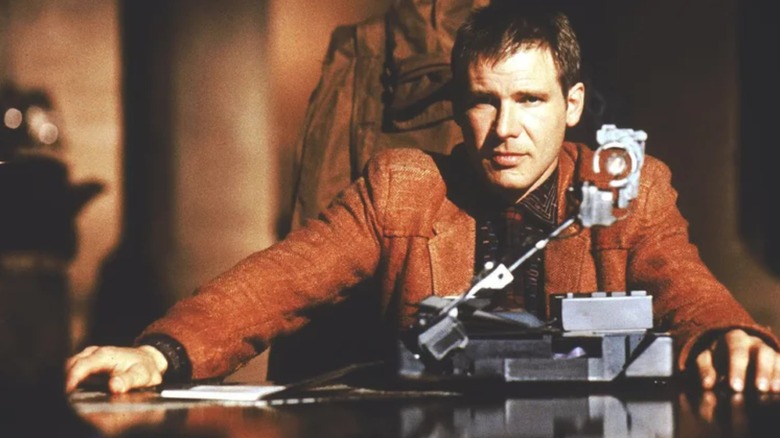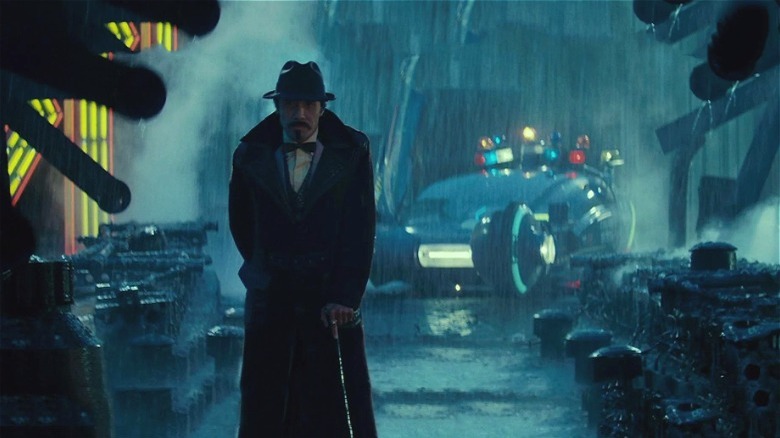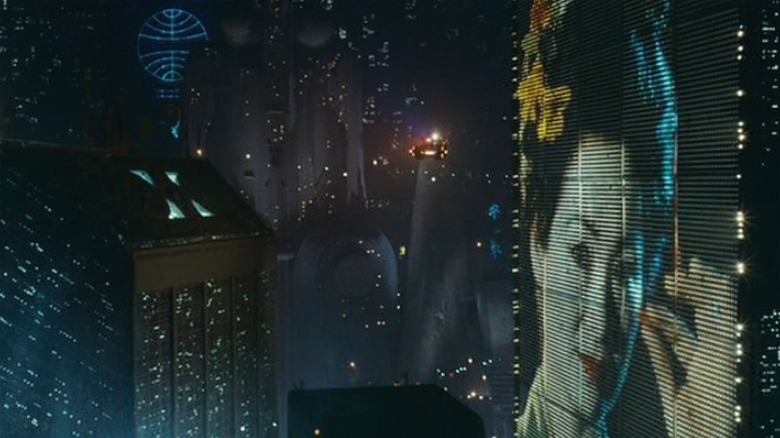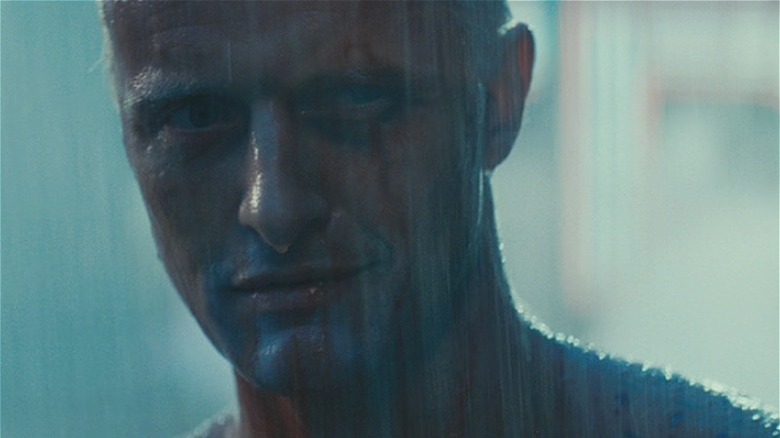Ridley Scott Doesn't Think Of Blade Runner As A 'Science Fiction' Film
"Los Angeles, November 2019." These words greet viewers within the first few minutes of Ridley Scott's 1982 dystopian sci-fi, "Blade Runner." The world-building in "Blade Runner" is rightfully lauded for its intricate aesthetics, as the film set a precedent for the science-fiction genre for years to come. Loosely based on Philip K. Dick's "Do Androids Dream of Electric Sheep?," "Blade Runner" tells the story of a crumbling metropolis steeped in existential crisis.
Rick Deckard (Harrison Ford, fresh off the success of "Star Wars: The Empire Strikes Back" and "Raiders of the Lost Ark") is a retired blade runner who is tasked with "retiring" a group of renegade replicants who have managed to escape off-world colonies. Human empathy has become the litmus test for differentiating between humans and replicants, but this yardstick is a flawed one in a world that is on the brink of moral degradation. Humans have become increasingly machine-like, while replicants have achieved AI singularity, exhibiting genuine psychological depth and empathy that surpasses their programming.
The world of "Blade Runner" sounds like the perfect science fiction setting, as it evokes the question of what makes us truly human, coupled with the themes of a capitalist, dystopian society with unstable socio-political structures. However, director Ridley Scott begs to differ, as he posits "Blade Runner" as a "contemporary" film as opposed to a strictly science-fiction one. Here's how he justifies his reasoning.
Blade Runner isn't a futuristic film, which is terrifying
In a 1982 video interview with Reelin' In The Years, Scott speaks at length about the themes in "Blade Runner," and what he means when he says it is not a science-fiction film. Clarifying his stance, Scott says that as the events of "Blade Runner" take place in 2019, it talks of a "near future," which was only "40 years away" at the time the interview took place. The dystopian "multi-national megalopolis" in "Blade Runner" is in shambles due to overpopulation and pollution, which have rendered the planet uninhabitable. Scott's aim was to weave these very real issues into a dystopian setting, mostly as a reminder that this should not be the kind of future we would want:
"Hopefully, there is a kind of dramatic separation from the audience and from the film at that moment, so then they're quite clear they're watching a fabrication, not necessarily a prediction of the future. I hope it's not the future."
By saying that the film is not a prediction of the future, Scott is hopeful that real-world overpopulation and climate change issues will be dealt with in ways that will help prevent such a bleak future. Despite his hope for humanity, Scott also says in the interview that he "do[es] believe that is the way it's going [depleted resources, environmental decay]" and that we could end up in a "Blade Runner" world "unless something really is done about it."
Well, terrible news, folks. "Blade Runner" is not science fiction anymore, nor is it a futuristic film because the film's future is already here, which makes Scott's film a contemporary thriller.
We already live in a Blade Runner world (well, sort of)
I know what you're thinking. We are a long, long way from practically-functional flying cars, and despite advancements in artificial intelligence, AI singularity is still an arena of scientific debate. However, "Blade Runner" correctly predicted a near-future (which is our present, unfortunately) shaped by cold-blooded capitalist interests that have adverse effects on the environment and its resources. Per a 2019 BBC article that talks about the film's prescience, the socio-political degradation and environmental collapse in "Blade Runner" "is not too far off from where we are today" — a world where the marginalized suffer due to the whims of those in power.
For instance, in Scott's world, the ultra-rich have the luxury of living off-world once the planet's resources dry up. The socially/economically marginalized have no choice but to survive in the smog-drenched streets and squat in abandoned apartments. The affluent who chose to stay back, such as the Tyrell Corporation, single-handedly control industrial production, and the gulf between the rich and the poor is on staggering display. Eldon Tyrell (Joe Turkel) plays "god" in the literal sense: he rejects his creations, i.e., replicants like Roy Batty (Rutger Hauer), who have evolved beyond corporate interests and seek autonomy in their short-lived existence. Tyrell pays the price for this, but the mechanics of the real world are far more complex and nuanced, unfortunately.
Although Scott didn't intend "Blade Runner" to be predictive of the world we live in today and does not consider it science fiction, the film does fulfill the role of a compelling dystopian storyline. Sci-fi is both meant to entertain and act as a playground for what might be while inspiring us to battle the oppression of the present so as to avoid these fictional (yet probable) realities.
The future does not have to be bleak
The aesthetics of "Blade Runner" helped spawn the cyberpunk movement, which has evolved into an aspirational lifestyle from a socio-cultural standpoint. Take the example of "Cyberpunk 2077," whose premise owes a lot to Scott's world, and the game further critiques the idea of a tech-fueled, authoritarian megalopolis. The BBC article linked above argues that we might have "fetishized" "Blade Runner"-like worlds on the basis of aesthetics alone, ignoring the dire warnings about what such a future could truly be like. I believe there's nothing inherently problematic about aspiring to cyberpunk aesthetics or a more tech-savvy world, provided that one is aware of the critiques that these fictional worlds posit. The future does not have to be bleak if we try and do something about it.
While Scott's view of his own creation is valuable, the brilliance of "Blade Runner" lies in the multiplicity of interpretations (as is the case for all good art). Apart from appreciating "Blade Runner" from a purely artistic/aesthetic perspective, it can be viewed as a cautionary tale about the issues that presently ail society. Scott significantly deviated from Dick's novel in seminal ways, but the key difference between the two is that the latter is a nihilistic nightmare, while the former is tinged with hope. The final scene between Deckard and Batty is an example of this, as it is a bittersweet one, but highlights the genuine wonder and empathy in a replicant that doubles as an act of rebellion in a mechanical, soulless world.
Batty lets Deckard live, which leads to him running off with Rachael (Sean Young), ushering in a new era for humanity and replicants. The aim has always been to not feel pessimistic about the future but to hope for a better one.



